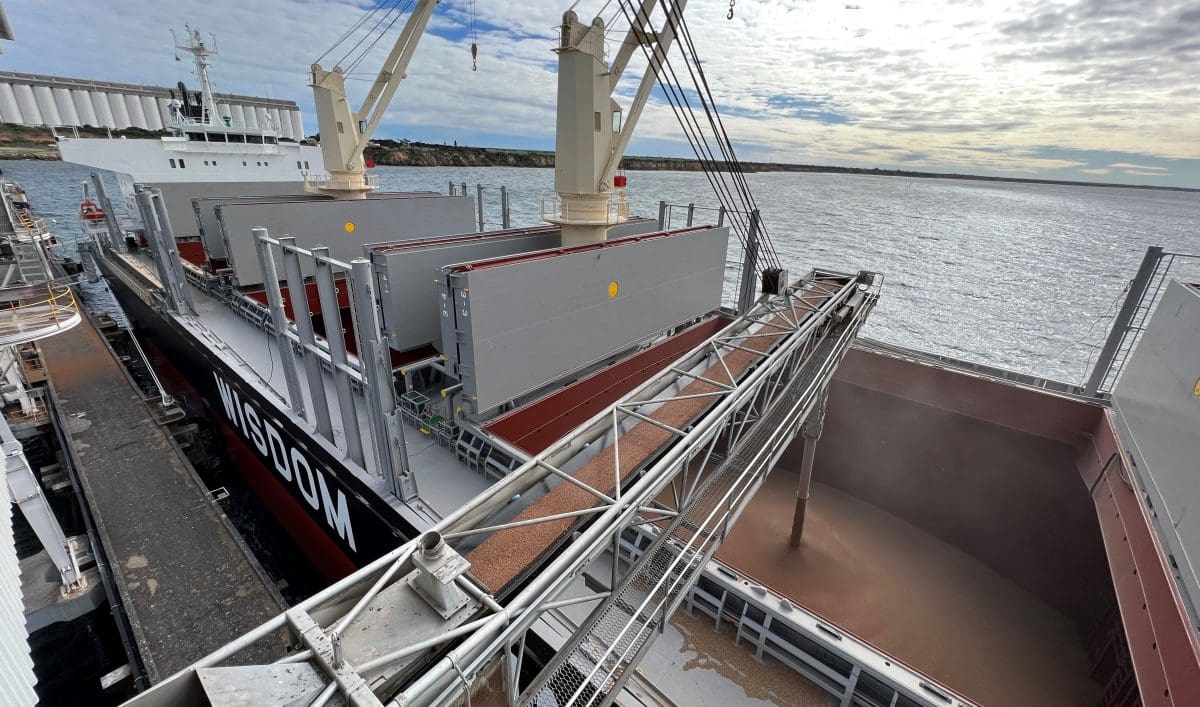
Australia regularly exports a total of 40-50Mt of grains, oilseeds, and pulses per annum. Pictured are lentils loading at the Port Giles terminal on South Australia’s Yorke Peninsula. File photo: Viterra
AUSTRALIAN farmers are world leaders in producing grain, and in 2022, Australia was the world’s leading wheat exporter.
But can we do better in supplying Australian grain that is even more affordable to local and overseas consumers?
This challenge is to be explored in a keynote presentation by Professor Ross Kingwell at the 2025 Australasian Agricultural and Resource Economics Society conference, being held from tomorrow to Friday in Brisbane under the theme of Meeting the Challenges of Transition to a Sustainable Future.
Prof Kingwell is an AARES Distinguished Fellow, and 2024 winner of the Grains Research and Development Corporation Western region 2024 Seed of Light award for his outstanding contribution to Australia’s grains industry.

Prof Ross Kingwell.
AARES is the pre-eminent society promoting research relevant to Australasia in agricultural, environmental, food, and resource economics and agribusiness.
Prof Kingwell is currently the chief economist in WA’s Department of Primary Industries and Regional Development, and is the former chief economist in the Australian Export Grains Innovation Centre.
In outlining the challenges and opportunities facing Australia’s grain supply chains, Prof Kingwell notes the impact of not taking action will only exacerbate local food prices, and lower export revenues, and farmers’ incomes.
“It’s a strategic imperative for Australian governments and industry to coordinate their investment and policy actions to ensure grain supply chains are efficient and effective,” Prof Kingwell said.
“Despite the vagaries of seasons, Australia’s production of grains, oilseeds and pulses is trending upwards.
“Efficiently moving that increasing volume of grain is a challenge but also an opportunity for improvement by everyone involved in Australia’s grain supply chains.
“It’s a good challenge to have; and we shouldn’t shy away from the opportunity it creates.
“The action list is clear and will resonate in rural and regional Australia.
“Reform regulations to create more cost-efficient road and rail transport and enhance port operations.
“Transport corridors need protection.
“Targeted investments in road maintenance and road improvements are required, along with coordinated investments in rail infrastructure. Automation and information-based technologies need to be assessed or developed and rolled out in supply chains.”
Prof Kingwell warned that the need for action will become urgent.
“Already there are limitations on supply chain capacity in some regions, especially from farm to port.
“There are limitations on boat sizes that many ports can accommodate.”
Prof Kingwell said many key assets, such as bridges, are reaching their end of life, and road damage and capacity limitations were prevalent.
“Yet red and green tape issues constrain new investments and many state governments have expenditure constraints due to their string of budget deficits.
“Also, in the shadow of elections, many governments are risk averse in applying policy solutions that challenge special interest groups.”
Prof Kingwell said the vagaries of seasonal production in Australia mean grain supply chains need to be capable of cost-effectively flexing up and down.
“In bumper years, farmers and bulk handlers need to quickly move large volumes of grain into storage, but complicating grain receival is the wider array of grain types and qualities that need segregation and sometimes identity preservation.”
He said Australia was increasing the volume of grain it produced, with recent years seeing 40Mt-50Mt of grains, oilseeds, and pulses exported in total.
“That places enormous pressure on grain handling, transport and ship-loading systems.
“But to receive attractive international prices, often grain needs to be shipped out in the first half of each year before the frequently large Northern Hemisphere crops become available, reducing price premiums for Australian grain.
“Not taking action will impact the costliness and efficiency of Australia’s grain supply chains with resultant adverse flow on effects for local food prices, export revenues and farmers’ incomes.”
NOTE: Prof Kingwell will delivering the paper outlined above and entitled in the plenary session at 9am on Wednesday
Source: AARES

HAVE YOUR SAY